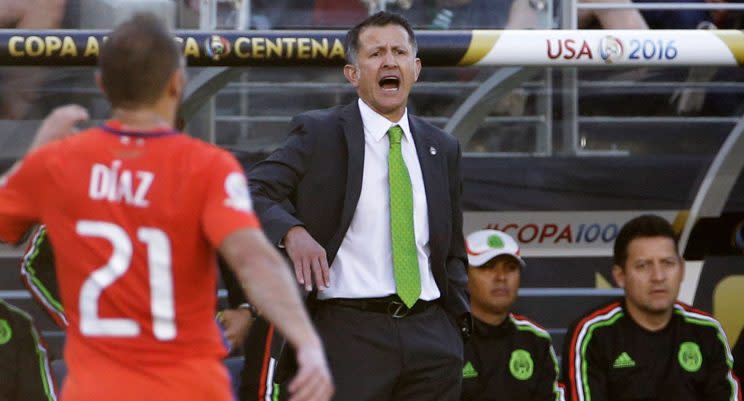How Mexico manager Juan Carlos Osorio turned a 7-0 loss into a valuable lesson

NEW YORK – It took Juan Carlos Osorio 50 days to get over the worst loss of his long and winding career.
It came after his Mexican national team had been deeply impressive in beating a Uruguayan powerhouse 3-1 in its opener of last summer’s Copa America Centenario. El Tri won Group C and faced eventual tournament winners Chile in the quarterfinals.
Mexico went into halftime down 2-0. Then things got out of hand. It was 5-0 before the hour. And 7-0 when the final whistle mercifully rang out.
[ Follow FC Yahoo on social media: Twitter | Facebook | Tumblr ]
Osorio – who had gone from a conditioning coach on the semi-pro Staten Island Vipers and wound through England, Major League Soccer, Liga MX, Colombian league and Brazilian league to finally manage mighty Mexico ‐ was distraught. But most of all, he was dumbfounded.
“Seventeen days before we lost against Chile, we defeated the same Chile – except for [star goalkeeper Claudio] Bravo – in a friendly game,” Osorio said. “And the first half, they were better than us. The second half, we completely dominated the game and we won 1-0 with Javier Hernandez’s goal. So I thought we can compete talent for talent. Fair enough, right?”
So after the loss, he carved out time for deep introspection. “I did something that very few do,” he said, recalling the aftermath of the June 18 defeat. “I went for almost 50 days without sleeping – thinking about it, and trying to overcome the loss. I went to get professional help. Not a psychiatrist – professional help from people who have had great defeats. Like [influential manager] Marcelo Bielsa. Five days with him, exchanging ideas. Confronting ways of thinking, and how to overcome that.”
“After 50 days, I came to great conclusions.”
He took solace, above all, from the Argentine literary icon Jorge Luis Borges. “He writes,” Osorio said, “that the defeat has the humility that the noise of victory doesn’t know, doesn’t deserve.”
*****Osorio chuckled at the question and took a long sip from his espresso. Then he smirked.
The Colombian has won 17 of his 22 games in charge of Mexico. He is undefeated in World Cup qualifying, winning eight of 10. He has the highest winning percentage – 77.3 – of any Mexican coach who was in the job as long as he has been. Ever. Yet there’s criticism anyway. He isn’t Mexican. He rotates his players too much. The playing style isn’t what everyone expects.
Is it sometimes impossible to please everybody in his job?
“Sometimes?” the affable Colombian said, still amused. “Nah. That’s not correct. It’s impossible at all times.”
Osorio smiles easily. He’s 56 (his birthday is today), with his hair graying at the temples and thinning at the top. But he retains the enthusiasm of a much younger man. When he talks, he is as meticulous and precise as in his work.
“It has a lot to do with the personality who is in charge,” Osorio said of the criticism at a recent round-table with reporters to promote El Tri’s friendlies against Croatia and Ireland in Los Angeles and New Jersey, respectively. “I think my main responsibility is to win games. And, B, try to make everybody appreciate our game.
“And I think [that] is where all the problems begin – everybody’s opinion on what playing well means,” he continued. “We think there’s one specific thing we have to do, and that’s to train and try to play the way we train. And if that’s well received and people appreciate that, that’s fantastic. If not, then we [accept] that and move on. There is no sense of anger or revenge from our part. We represent Mexico with dignity and for the love to win, and not to fear the loss. Everything else, we try to understand, we try to go from the criticism done in the right way. The other, we just try to ignore.”
*****El Recreationista. That’s what they nicknamed him upon his return to Colombia in 2006, some two decades after he left as a chronically injured professional midfielder who sensed he’d better get into coaching.
It’s not a kind nickname.
“It’s someone who entertains other people – in a derogatory way,” Osorio translated.
So let’s explain it, because it underscores his remarkable rise. After leaving Colombia, Osorio briefly went to college in Iowa before working in construction and food service in New York. He eventually found his way to Southern Connecticut State where he would earn a degree in exercise science.
But he was never far from the game. While in college at Connecticut, he would go to New York City during the weekends to try to play in semi-pro games. “I remember coming here every single weekend to play football and try to make some extra money to fund my studies,” he said.
He landed a job with the Vipers in 1998, but the club went bust after the season. Osorio latched on with the New York MetroStars of MLS as an assistant. When he quit to pursue a master’s degree in science and football in Liverpool, he was told he was crazy. He watched the city’s storied Liverpool FC practice through a fence, and then he got a call from another Premier League team.
“My first job with Manchester City, I was very surprised when I first received the call,” Osorio remembered. “I was [most recently] the assistant coach with the MetroStars. I thought they were joking, so I hung up. They called me back and they mentioned that my name came out of Vern Gambetta.”
And here’s where El Recreationista becomes germane to our story. Osorio was a follower of Gambetta, a pioneer of “functional training.” He learned to work with body weight and resistance bands and medicine balls. City was interested in these new techniques and hired him as a trainer. After he was promoted to assistant coach, Osorio was hired by Millionarios back in his home country in his first head-coaching job. He brought his elastic bands with him.
“It was something new for everybody,” Osorio said. “Nowadays, that’s the way you can see even the German national team warms up with those elastic bands. Back in those days, they were not well received.”
He was mocked for being ahead of his time, and that’s how he got the nickname.
*****After the Chile loss, Osorio didn’t seem long for the Mexico job. He offered to resign.
In spite of being undefeated in the all-important World Cup qualifiers, and indeed losing just one game at the time, pressure on him built by the day. Mexico has fired undefeated managers before. But the federation, for once, opted for continuity. It had burned through four managers during the last World Cup qualifying cycle, reaching Brazil 2014 by a whisker. Osorio got to stay and see his project out.
Things have stabilized since. Beating the U.S. in a qualifier on American soil for the first time since 1972 helped. Ironically, that contributed to the U.S. careening into its own crisis and its first mid-cycle coaching change in decades.

In the aftermath, Osorio didn’t just confront his own failings in the Chile loss. He meticulously debriefed his team as well, in a presentation that took an hour and 20 minutes.
“I had to recreate it,” he said.
They analyzed the game in painful detail, and even drew parallels to Brazil’s famous 7-1 semifinal loss to Germany at the 2014 World Cup.
Osorio decided to turn the great trauma of his career into a teachable moment. For his team and for himself.
“I say to myself, ‘I’m going to learn from this defeat,’ ” Osorio said. “Because I never thought I could lose for more than four goals. Now we know. That’s why I refer to that as an accident.”
It’s inherent to accidents that they might reoccur. “That’s why now I prepare even into more details the games,” Osorio said. “I have Plan A. Plan B – as I used to have. And now we even have Plan C. It can happen again but I would realize when it starts happening. At 0-2 you can react. And maybe at 0-3 you still can have a reaction. 0-4, there’s no reaction to that. Now we have a contingency plan.”
Osorio learned. Just as he has his entire career. Choosing to cut off his own playing career to go to college. And leaving a good coaching job to further his education.
“By me doing that,” Osorio said, “nowadays I can say I’m a very, very better manager, better coach and a very strong man to understand that that can happen again.”
The lesson in the Chile loss wasn’t that it was an aberration but that even the most prepared of managers can always prepare more.
Leander Schaerlaeckens is a soccer columnist for Yahoo Sports. Follow him on Twitter @LeanderAlphabet.
More soccer coverage from FC Yahoo:
• USMNT faces another must-win, but against Trinidad and not Mexico?
• David Beckham might actually be getting his MLS expansion team after all
• Real talk: Madrid’s golden age back in the day or present-day?
• Real Madrid beats Juventus for first Champions League title repeat
• Watch Mandzukic score one of the greatest Champions League final goals
• Mexico dominates Ireland 3-1 in final tuneup before a loaded summer


